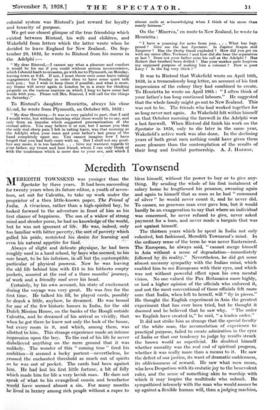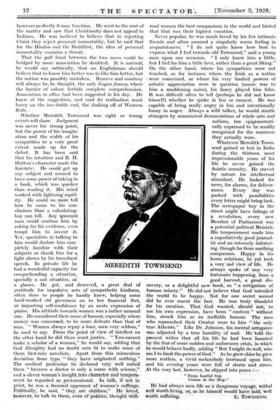Meredith Townsend
MEREDITH TOWNSEND was younger than the Spectator by three years. It had been succeeding for twenty years when its future editor, a youth of seven- teen, set out for Calcutta, to take up work under the proprietor of a then little-known paper, The Friend of India. A vivacious, rather than a high-spirited boy, he looked forward to the adventure in front of him as' his first chance of happiness. The son of a widow of strong mind and slender purse, he had no knowledge of the world, but he was not ignorant of life: He was, indeed, only too familiar with bitter poverty; the sort of poverty which galled his pride, restricted his desire for learning and even his natural appetite for fdoOd.
Always of slight and delicate physique, he had been roughly, used in a hard school, by boys who seemed, to his sore heart, to be his inferiors, in alrbut the contemptible, particular of physical prowess: Now he was leaving the old. life behind him with £15 in his hitherto empty pockets, assured at the end of a three months' journey, of work and a friendly roof over his head.
.Certainly, by his own account, his state of excitement during the voyage was very great. He was free for the first time. He talked. his fill, he played cards, possibly he drank . a little, anyhow, he dreamed. He was bound for one of the few historic houies in India, for the old DutCh _Mission House, on the banks of the Hoogli outside Calcutta, and he dreamed of his arrival so vividly, that when hegot there he knew not only the look of the house, but every room in it, and which, among them, was allotted to him, This strange experience made an intense impression upon the boy. To the end of his life he never disbelieved_ anything on the mere ground that it was unlikely. The wonder of this " Coming true " fired his ambition--it seemed a lucky portent—nevertheless, he _crossed the : enchanted threshold as much out of spirits as he. Was out of pocket. The cards had been against him. He had lost his first little fortune, a hit of folly which made him for life a very lavish man. He dare not speak of what to his evangelical cousin and benefactor _would have seemed almost a sin. For many months he lived in luxury among rich people without a rupee to bless himself, without the power to buy or to give any- thing. By sending the whole of his first instalment of salary home he lengthened his penance; swearing again and again to himself that as soon as he had " command of silver " he would never count it, and he never did. To causes, no generous man ever gave less, but it would hardly be an exaggeration to say that where an individual was concerned, he never refused to give, 'never asked payment for a loan, and never made a bargain that was not against himself.
The thirteen years which he spent in India not only Colon-red, but fashioned, Meredith Townsend's mind. In the Ordinary sense of the term he was never Easternized. The European, he always said, "'cannot merge himself in Asia without a sense of degradation—immediately f011owed reality." Nevertheless, he did get some almost uncanny sympathy with the Indian mind, which enabled him to see Europeans with their eyes, and which was not without powerful effect upon his own mental vision. No one valued the Pax Britannica more highly, or had a higher opinion of the officials who enforced it, and not the most conventional of those officials felt more sure that India, when left to herself, will " fly in pieces." He thought the English experiment-in Asia the greatest experiment that has ever been tried, but he thought it doomed and he believed that he saw why. " The order we English have created is," he said, " a leaden order."
It did not strike him as strange that the special faculty of the white man, the 'accumulation' of experience to practipal purpose, failed 'to create admiration in the eyes of India or that our tendency to judge by results struck the brown world as superficial. He doubted himself whether morality was the real end of spiritual progress, whether it was really more than a means to it. He saw the defect of our justice, its want of dramatic-suddenness, its obliviousness of reward. He saw what men mean, who love Despotism with its ecstatic joy to the benevolent ruler, and the sense of something akin to worship -with which it ' may • inspire the multitude who submit. He sympathized intensely with the man who would sooner be up against a flexible human will, than a judging machine, however perfectly it may function. He went to the root of the matter and saw that Christianity does not appeal to Indians. He was inclined to believe that in rejecting Christ they reject personal immortality, but he said that for the Hindoo and the Thiddhist, the idea of personal immortality contains a threat. That the gulf fixed between the two races could be bridged by more association he doubted. It is natural, he would say satirically, that an Englishinan should believe that to know him better was to like him better, but the notion was possibly mistaken. Reserve and courtesy will always be, he thought, the only lingua franca, where the barrier of colour forbids complete comprehension. Association in office had been suggested in his day. He knew of the suggestion, and said its realization must hurry on the inevitable end, the shaking off of Western Rule.
was never his strong point, but the power of his imagin- ation and the width of his and a clever woman's insight. into chartictp and temtierk- menf he regarded as Preternatural. In talk, if not in print, he was a frenzied 'opponent of worrian's suffrage. Politically, he said, " they are *Wren:" He loVed, however; to to them; Pelitiek' thong& Well= read women the best companions in the world and hinted that that was- their highest vocation.
Never popular, he was much loved by his few intimate friends and often aroused a singularly warm feeling in acquaintances. " I do not quite know how best to express what I feel towards old Townsend," said a-young man upon one occasion. " I only know him a little, but I feel for him a little love, rather than a great liking." On the other hand, where his sympathies were not touched, as. for instance where the Irish as a nation were concerned, or where his very limited powers of artistic appreciation were in question (music was to him a maddening noise), his fancy played him false. It was difficult often to tell (perhaps he did not know himself) whether he spoke in ftin or earnest. He was capable of , being, really angry , in fun and intentionally funny in anger. Always a wild talker, he would startle. strangers by nonsensical denunciations of whole arts and nations, too epigrammati- cally expressed to be readily recognized for the nonsense they actually were. Town- send Meredith Town- send gained or lost in India (hiring the thirteen most impressionable years . 'Of 'his life he never gained the Asiatic serenity. He craved by nature for intellectual stimulant. He looked for news, for alarms, for deliver- ances. Every day was packed With. possibilities every letter might bring hick. The. neWspaper boy in the street might have tidingS of a revolution, every. new Menaber of Parliainerif was a potential political Messiah. His temperament made him diuperlatiVely good journal= istand an intensely interest= _ . . ing, though far frOM 'soothing Happy in his hoMe relations, he yet took a very sad view of life. He always' spoke of 'any very fortunate. happening,-from gOod harvest, great *ClisL covery, or. a delightful new boOk; as " a mitigation of human misery." He did not helieVe that God intended the world to hippy. Not for- one secret Second did he ever resent the fact. He was truly thankful tar his creation. That God wanted, should ilOt;- to use his own expression, have been " content " WithOnt him, struck him as an ineffable honour. The Men win) reproached their Creator were to him " the only true. Atheisti" Like Di. JOhnsOn, his inerital.ariogariee was adjusted by a true huinility Sold. Ile-told the present writer that all his life he had been' haunted by the fear of sonleauddenand unforeseen Crisis, in which he would behave badly, adding " BLit I might do Welt who aim; I tolimif the poWer COd." AS he grew Older he grew more restlesi, a vivid Melancholy iricieased upon hiM, and his evening Years' were full of storm' and stress. At the very last, hoWeVer, he slipped Into peace
" From fearful trip Cornea in the Ship." - He had alWaYs seen life as 'a dangerous voyage; withal well 'Worth living, or, as he hiniself would hav"e iaid; well



















































































































 Previous page
Previous page